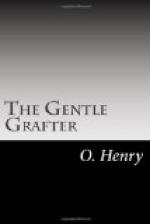Directly I dragged out my valise and went down in it for labels.
“Hair tonic labels are out,” says I. “Only about a dozen on hand.”
“Buy some more,” says Buck.
We investigated our pockets and found we had just enough money to settle our hotel bill in the morning and pay our passage over the ferry.
“Plenty of the ‘Shake-the-Shakes Chill Cure’ labels,” says I, after looking.
“What more do you want?” says Buck. “Slap ’em on. The chill season is just opening up in the Hackensack low grounds. What’s hair, anyway, if you have to shake it off?”
We pasted on the Chill Cure labels about half an hour and Buck says:
“Making an honest livin’s better than that Wall Street, anyhow; ain’t it, Pick?”
“You bet,” says I.
HOSTAGES TO MOMUS
I
I never got inside of the legitimate line of graft but once. But, one time, as I say, I reversed the decision of the revised statutes and undertook a thing that I’d have to apologize for even under the New Jersey trust laws.
Me and Caligula Polk, of Muskogee in the Creek Nation, was down in the Mexican State of Tamaulipas running a peripatetic lottery and monte game. Now, selling lottery tickets is a government graft in Mexico, just like selling forty-eight cents’ worth of postage-stamps for forty-nine cents is over here. So Uncle Porfirio he instructs the rurales to attend to our case.
Rurales? They’re a sort of country police; but don’t draw any mental crayon portraits of the worthy constables with a tin star and a gray goatee. The rurales—well, if we’d mount our Supreme Court on broncos, arm ’em with Winchesters, and start ’em out after John Doe et al. we’d have about the same thing.
When the rurales started for us we started for the States. They chased us as far as Matamoras. We hid in a brickyard; and that night we swum the Rio Grande, Caligula with a brick in each hand, absent-minded, which he drops upon the soil of Texas, forgetting he had ’em.
From there we emigrated to San Antone, and then over to New Orleans, where we took a rest. And in that town of cotton bales and other adjuncts to female beauty we made the acquaintance of drinks invented by the Creoles during the period of Louey Cans, in which they are still served at the side doors. The most I can remember of this town is that me and Caligula and a Frenchman named McCarty—wait a minute; Adolph McCarty—was trying to make the French Quarter pay up the back trading-stamps due on the Louisiana Purchase, when somebody hollers that the johndarms are coming. I have an insufficient recollection of buying two yellow tickets through a window; and I seemed to see a man swing a lantern and say “All aboard!” I remembered no more, except that the train butcher was covering me and Caligula up with Augusta J. Evans’s works and figs.




